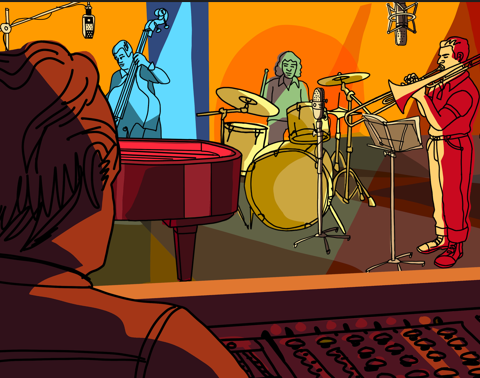Matangi/Maya/M.I.A.
(USA/UK, 96 min.)
Dir. Steve Loveridge
Who knew M.I.A. originally wanted to be a documentary filmmaker? Thank goodness the British-Sri Lankan rapper (née Mathangi Arulpragasam) had a fascination with video cameras, since she fortuitously chronicled her rise to fame. The tapes of M.I.A.’s childhood, adolescence, and young adulthood are meticulously chronicled on a range of home movies in the documentary Matangi/Maya/M.I.A. It’s a fun and revealing portrait told with M.I.A.’s countercultural voice and peppy energy.
M.I.A. apparently isn’t happy with this documentary, but audiences should be. Early reports from Sundance indicate that the rapper gave director Steve Loveridge oodles of tapes to deliver a doc about her concert tours and live shows, but say that she was peeved when the final product offered a deep dive into her childhood and family history with the Tamil Tigers. (Her father, Arul, is a founding member of the organization.) The doc lets a polarizing pop culture figure tell her own story in her own words to reveal how one person’s background, family, and history radically shape her art.
Matangi/Maya/M.I.A., as the title conveys, tours audiences through the many facets to the rapper’s persona. Her experience straddling two worlds is evident throughout the history chronicled in her American Beauty -ish hyper-documentation. (It seems someone always had a camera rolling even if Maya didn’t.) This pre-selfie culture portrait sees the young Maya negotiate her identity as a First Generation immigrant in the UK, disconnected with this ambiguous “home” in Sri Lanka where her absent father remained for years until, like his family, he fled for concerns of safety.
The doc shows Maya discovering her voice behind the camera, turning over pieces of her history, and exploring her identity through personal documentary filmmaking. Her film work is actually pretty good and Loveridge illustrates how Maya found some early success including a collaboration with Spike Jonze. One thread to Maya’s story is that artists must continually redefine themselves and Loveridge offers behind-the-scenes footage of Maya in which her experiments with sound mixing encouraged her to mix some beats and document her experiences through rhythm and poetry, rather than film images.
Maya became M.I.A.—named “Missing in Action” for a cousin who disappeared in Sri Lanka—when she stormed the Internet by uploading her music to early social networks. Her music, a mix of pop culture references, political views, badass social commentary, and reflections on race, gender, and power, were a bold punch in the face to post-Spice Girls BritPop. The doc charts her rise just about as quickly as it happened—one could argue that Loveridge downplays the massive success of M.I.A.’s song-of-summer hit “Paper Planes” and doesn’t give the tune the attention it deserves aside from unpacking the lyrics about the negative stereotypes people harbour about immigrants. However, the decision to focus on the cultural significance of M.I.A.’s music, rather than her popular or commercial success, is the film’s strength.
Loveridge gives far more play to the notoriety M.I.A. gained when she flipped audiences the bird while performing with Madonna during the 2012 Super Bowl halftime show. The doc offers ample coverage of the negative press M.I.A. received with commentators making special mention of her family’s history with the Tamil Tigers to liken her behaviour to that of a political radical. The doc tightens its focus on the Super Bowl incident to highlight how M.I.A. makes the establishment uncomfortable with her outspokenness and her willingness to challenge authority by drawing attention to gross human rights violations in Sri Lanka. A little brown woman with a big mouth is just too much for the world to handle, even in the age of “wokeness,” and Matangi/Maya/M.I.A. builds to the controversial incident to emphasize the dynamics of privilege, power, and exclusion that make stars like M.I.A. anomalies. The doc furthers the conversation for diverse representation through all levels of the arts and media.
The doc gets really interesting—and this might be the part of the film that M.I.A. really doesn’t like—when it unpacks the backlash to her success. M.I.A.’s music, character, and outspokenness fuel talk show commentary and Saturday Night Live parodies insinuating that she milks her family connection to the Tigers for street cred and cultural cachet. This segment includes the spectacularly unflattering 2010 profile in the New York Times Magazine that depicted the rapper gabbing about human rights problems while scarfing down truffle fries, essentially painting M.I.A. as a hypocrite of the highest order. (The doc notes that the writer, not M.I.A. offered the offending nosh.) They’re tough yet fair questions, since most of M.I.A.’s experience comes through association rather than first-hand encounters—but she withstands the scrutiny. Loveridge’s presentation of M.I.A.’s early years chronicles legitimate engagement with her heritage, like a soul-searching trip to Sri Lanka to learn more about the conflict she escaped, and proves that she walks the walk just as well as she talks the talk.
Matangi/Maya/M.I.A. takes its subject to task, cuts her open, and probes her insides. Loveridge’s film is a mess of contractions and a ball of furious energy still figuring itself out. M.I.A.’s never been one for vanilla flavouring, so a doc that explores the harder questions of her success is far more reflective of her character than a self-serving concert film could be. After all, bad girls do it well.
Matangi/Maya/M.I.A. opens Oct. 5 at Hot Docs Ted Rogers Cinema.











